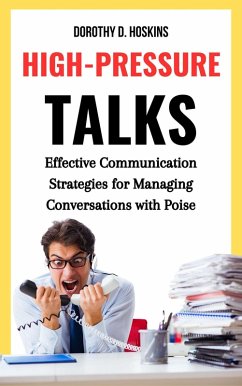Pressure changes how people communicate. It triggers emotional responses, fuels misunderstandings, and amplifies the risk of saying the wrong thing at the worst time. Stress weakens articulation, clouds judgment, and leads to reactions driven by impulse rather than intention. The difference between a leader who thrives under pressure and one who collapses under it often comes down to their ability to control the conversation instead of being controlled by it.
Words carry weight, but delivery defines their impact. A strong communicator doesn't just speak wellthey listen strategically, anticipate reactions, and adjust their approach in real time. They recognize the unspoken cues that dictate the direction of an exchange, ensuring they remain in control without resorting to dominance. They defuse hostility without appearing weak, assert their points without being dismissive, and steer conversations toward productive outcomes, even in volatile situations.
Every high-pressure conversation follows an invisible rhythmone that can be mastered with the right strategies. Understanding how to manage tone, control pacing, and maintain presence transforms interactions from confrontational to constructive. Those who learn how to neutralize aggression without backing down, reframe negative discussions without appearing evasive, and command attention without demanding it gain an undeniable advantage. They become the people others turn to in moments of crisis, knowing they will bring clarity where others bring chaos.
Power dynamics play a crucial role in communication. Whether speaking to a superior, addressing a difficult client, or de-escalating an argument, understanding how to shift the balance of control determines the trajectory of the discussion. Confidence without arrogance, authority without intimidation, and assertiveness without aggression allow speakers to maintain credibility while keeping the conversation productive. The key is knowing when to push forward, when to hold back, and when to redirectskills that separate effective communicators from those who merely react.
Preparation defines performance. The most composed individuals in high-pressure situations aren't naturally giftedthey are trained. They anticipate objections before they arise, recognize the patterns of resistance, and adjust their responses accordingly. They have strategies for handling interruptions, countering manipulative tactics, and ensuring their message remains intact, even when challenged. With the right preparation, no conversation feels unpredictable, and no response feels forced.
Mastering difficult conversations isn't just about avoiding conflictit's about transforming tension into opportunity. Leaders who communicate effectively inspire confidence, employees who articulate their value earn respect, and individuals who handle personal disagreements with poise strengthen their relationships rather than damage them. The ability to manage pressure-laden interactions separates those who struggle from those who lead.
Dieser Download kann aus rechtlichen Gründen nur mit Rechnungsadresse in A, B, CY, CZ, D, DK, EW, E, FIN, F, GR, H, IRL, I, LT, L, LR, M, NL, PL, P, R, S, SLO, SK ausgeliefert werden.









